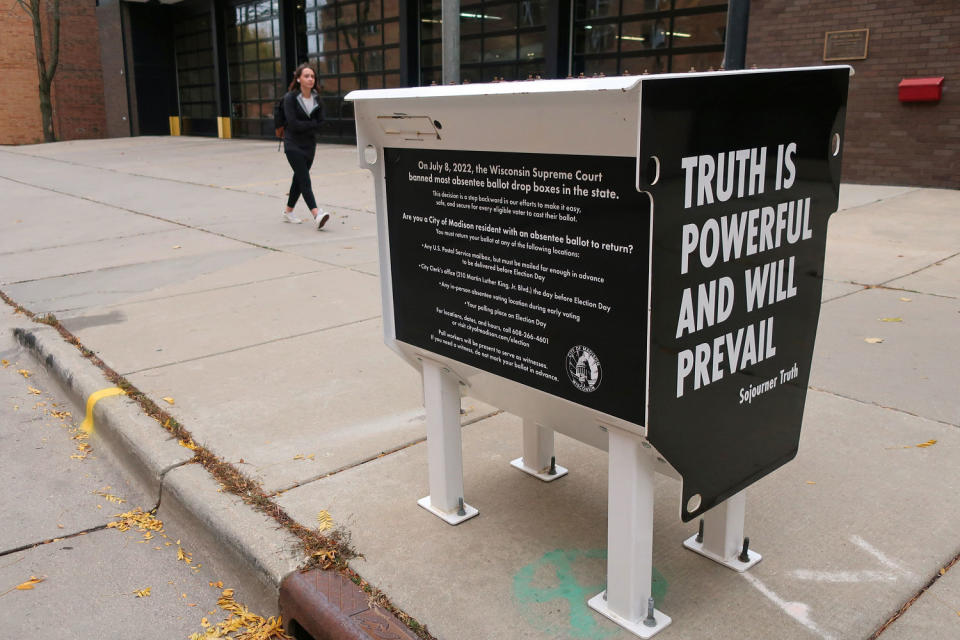Wisconsin Supreme Court to revisit ruling that banned most ballot drop boxes
The Wisconsin Supreme Court is set to hear oral arguments Monday in a pivotal case that will determine the future of absentee ballot drop boxes in the battleground state’s elections.
The case will give the court’s liberal majority the opportunity to reverse a ruling the court made less than two years ago — when conservatives held the majority — that significantly reduced the number of absentee ballot drop boxes in the state.
If the court’s current 4-3 liberal majority overturns that ruling, it could result in a return of the widespread use of absentee ballot drop boxes for the upcoming presidential election.
Democrats and progressives in the state filed numerous briefs in the case urging the court to overturn its 2022 decision. Conservative groups and the Wisconsin Republican Party have filed several briefs in support of upholding the current rules regarding drop boxes.
“They make voting more accessible and possible for people. That’s the reason we support it,” said Jay Heck, the executive director of Common Cause Wisconsin, the state’s branch of the national nonpartisan government watchdog group. Common Cause Wisconsin filed an amicus brief in the case pushing for the 2022 ruling to be overturned.
“Despite worries and claims by election deniers and conspiracy theorists, drop boxes were not used for any nefarious purpose like they’ve claimed,” he said.
Following the 2020 election, the use of drop boxes for absentee ballots was repeatedly criticized by former President Donald Trump and his allies, who falsely claimed that the practice led to widespread voter fraud.
Wisconsin GOP Chairman Brian Schimming, whose party also filed an amicus brief in the case, said his worries about returning to a wider use of drop boxes included “the possibility for hijinks” by Democrats and “the security of drop boxes,” but that “our primary concern here is that the law gets reversed.”
“The law keeps moving around in this state unnecessarily,” he said, which could create “confusion” and “chaos” during voting.
“I’m not hostile to looking at things differently,” Schimming said, “but we’re six months away” from the election and “we have a Supreme Court who feels as though they’re the second Legislature.”
The Wisconsin Elections Commission, which oversees elections in the state, implemented more lenient rules regarding drop boxes at the outset of the Covid pandemic in 2020. Wisconsin law does not weigh in on the use of drop boxes, which has contributed to the continuing legal situation on the issue.
In a 4-3 decision, the Wisconsin Supreme Court ruled in July 2022 that Wisconsin voters casting absentee ballots would no longer be able to drop them in boxes located anywhere except the offices of election clerks.
The state’s high court ruled that only the state Legislature — which is controlled by Republicans — has the power to enact laws and policy regarding absentee ballot drop boxes, not the Wisconsin Elections Commission.

After liberals won a majority on the court in 2023 for the first time in 15 years, the Democratic group Priorities USA filed a lawsuit that seeks to overturn the 2022 ruling curtailing the use of drop boxes, as well other rules and restrictions regarding absentee voting. (After a Wisconsin trial court narrowed the suit, the group appealed directly to the state Supreme Court, skipping over lower appeals courts).
The Wisconsin Supreme Court’s four liberal justices voted in March to accept the case, agreeing specifically only to resolve whether the 22-month-old ruling was incorrectly decided, but not any other issues raised in the original suit.
Priorities USA has said in filings that the 2022 ruling was incorrectly decided because Wisconsin law is silent on the issue of drop boxes. While the group acknowledges that Wisconsin laws do make clear that absentee ballots must be returned by mail or in person, it claims that it remains unclear whether voters can return absentee ballots in person to locations other than a clerk’s office.
“Nothing prevents municipal clerks from agreeing to accept ballots at locations other than their own offices, including via secure ballot drop boxes placed elsewhere,” the group said in a filing.
Groups pushing for the ruling to be overturned say the fact that the court has taken the case signals that its liberal justices have concerns about the 2022 ruling and are likely to reverse it.
“You don’t prejudge them, but I’d be surprised if they didn’t [overturn], just from the fact that they took the case,” said Common Cause’s Heck. “Three of the current progressive judges were vehemently opposed to the ruling in 2022, and then the newest addition, Janet Protasiewicz, has pretty much aligned with them thus far.”
This article was originally published on NBCNews.com

